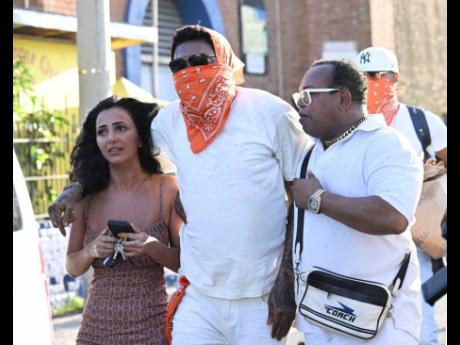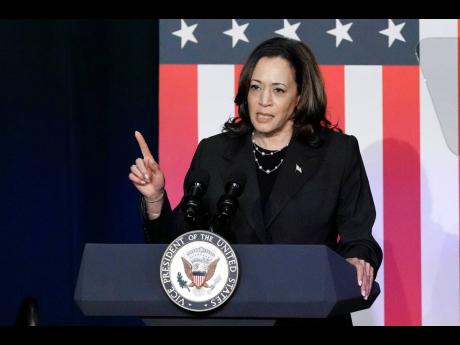Imani Tafari-Ama | Dancehall, decolonising justice and woman of colour for US president?
The last 10 days in July witnessed some of the most remarkable events of 2024 to date. The crowning of Kamala Harris as the 2024 presidential candidate in the United States (US) and the release of dancehall artiste Vybz Kartel (Adidja Palmer) and his three co-accused, Shawn ‘Shawn Storm’ Campbell, Kahira Jones and Andre St John, from prison on the eve of Emancipation Day, were two of the most stunning events.
Kartel’s lawyer, Isat Buchanan, argued that this case demonstrates the value of retaining the Privy Council as Jamaica’s highest court of appeal. This call comes in the wake of the successful appeal against conviction. The case was tainted by the attempt of a bribed juror to influence his colleagues to compromise the verdict.
The Jamaican court allowed the misconduct of the juror to pass and he continued to participate in the trial. He was later convicted, but not before the four men were served life sentences. That was 13 years ago. In March this year, presiding Privy Councillors pointed out this misconduct flaw. It was cause to quash the convictions, an option they left for the Jamaican Court of Appeal to manage.
To demonstrate the operational legacy of colonialism, the reigning British monarch, King Charles (who is routinely honoured at the start of Jamaican Court and Parliament sessions), exercised head-of-state rights when he ordered the Jamaican government to pay J$150 million, the costs to bring the Kartel case to the London-based court.
It is ironic that the refusal of the Jamaican Court of Appeal to countenance the prosecution’s demand for a retrial happened in the context of Emancipation Day celebrations. Despite 62 years of Independence from Britain, Jamaica’s halting steps towards self-rule republic status are (as always) faltering. No, we do not need to retain the Crown as head of state, the judiciary and the highest court of appeal. We just need to get the job done right, in our own right. Right?
On his release from the General Penitentiary, it was apparent that something was off with Vybz. The superstar kept his face, eyes and neck covered. When he revealed himself, there were clear signs that his suffering from Graves’ disease has taken a toll. Kartel’s face and eyes looked puffy and he appeared to be a shadow of his former, vibrant self.
Considering Vybz Kartel’s global appeal, what are the image and political implications of this legal charade for Jamaica and its Constitution? Will Vybz now settle down to enjoying marital bliss or will he throw his towel into the political ring? Time will tell.
UNPRECEDENTED
Kamala Harris’ skyrocketing to the position of US presidential candidate is unprecedented. No woman of colour has done this before. Unelected for office to date (she had made an unsuccessful bid for the presidency in 2020), she has faced the acrimony of racist and sexist critics. It seems that these resentments were seething below the surface and have quickly erupted into snide suggestions that she is not qualified for the job.
The racist response is that she was a DEI hire. This slur has been voiced in many quarters, suggesting that Harris was introduced to the political platform because diversity, equity and inclusion (DEI) hiring practices informed Joe Biden’s choice of her as his running mate for the 2020 elections. In other words, she is a beneficiary of affirmative action.
Harris’ detractors have also said that she has not been tough enough on border control. The recent increase in immigrant arrivals has been weaponised by Republicans and Democrats alike. The associations drawn between migrant arrivals and increase in criminality even belie reputable research results that show that crime has actually declined in the corresponding period. The trauma that some families have suffered when they were separated at the border also outweighs the benefits of relocation.
As the daughter of migrants, how will Harris negotiate her multiple embodied contradictions? She is married to a white man and is the daughter of a Jamaican father and an Indian mother. By ‘one-drop’ misrepresentations, she is called black. However, economists Michael Witter and George Beckford would have called this woman of mixed race “socially white”. In all this, we must remember that race is a myth; the human race started in Africa.
Beyond her notoriety as a trial judge, how agile is Harris in her ability to navigate the world of racism, patriarchy, and sexism as a head of state? How will she deal with evangelical power brokers who succeeded in overturning Roe vs Wade and its representation of reproductive rights?
Harris’ detractors have hacked into her political ambitions, which they read as a liability for the Democratic Party. However, the remarkable release of $200 million in donor money to support her candidacy has broken records of funds flowing into electioneering coffers in such a short period of time. The public decline of Joe Biden’s mental health and the provision of a credible competitor for Donald Trump has worked in Harris’ favour. Trump and J.D. Vance, his controversial running mate, have to wheel and come again as Harris advances down the popularity track.
TRASHED
Harris has been trashed by progressives for failing to speak out before now against the ongoing genocide in Gaza.
“I will not be silent,” she declared on the crest of an influential campaign speech, which signalled her awareness of the untenable suffering of the Palestinian people. USA weapons have allegedly been supplied under her watch, as vice-president, to deliver the devastating human losses, the effects of which she is now bemoaning. Where was her vice-presidential voice when these weapons contracts were signed off? On the presidential campaign trail, Harris’ eloquent empathy for sufferers of this ethnic cleansing rings hollow.
The endorsement of the Obamas and influencers like Megan Thee Stallion has changed Harris’ credibility and popularity. Yet, the gap between speeches and policy is crucial. And the public is reading between the lines. This raises even more questions. How will Harris handle the ongoing wars in the Middle East, the rise of others, as an economic and political aggregation, which is scheduled to meet in October, ahead of the US election in November?
The bottom line is, will she win against the relentless Republican challenge? It’s another instance of ‘time will tell’.
Imani Tafari-Ama, PhD, is a Pan-African advocate and gender and development specialist. Send feedback to i.tafariama@gmail.com and columns@gleanerjm.com


